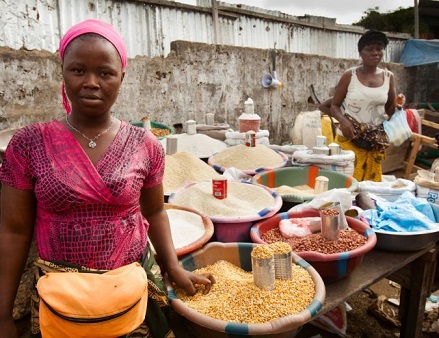
A fascinating 2015 study, nicknamed The African Diet Swap, and published in Nature Communications, confirmed that a high-carb, high-fiber diet like that of the rural Africans can substantially reduce colon cancer risk. This story has been culled from a publication appearing here
Colon cancer is the second leading cause of cancer death in the U.S. And rates of colon cancer are much higher in Western countries (Europe, Canada, the U.S. and Australia) than in Africa or the Far East.
The rate of colon cancer is over 16 times higher in African Americans than in rural South Africans (65 in 100k people in the U.S. vs 4 in 100k people in Sub-Saharan Africa).
For decades, researchers like Dr. Denis Burkitt have postulated that Western diets, high in animal protein and fat but low in fiber, raise colon cancer risk compared with African diets, which are high in whole food carbohydrates, resistant starch and fiber, and low in fat, protein and oils.
A fascinating 2015 study, nicknamed The African Diet Swap, and published in Nature Communications, confirmed that a high-carb, high-fiber diet like that of the rural Africans can substantially reduce colon cancer risk. The study also demonstrated that your microbiome (bacteria living in your gut) plays an important role in this anti-cancer effect.
An international team of scientists from the Imperial College London and the University of Pittsburgh carried out the study with two groups: 20 African Americans from Pittsburgh and 20 rural South Africans from KwaZulu-Natal. The two groups of middle-aged adults swapped diets under tightly controlled conditions for two weeks.
All members of the study had colonoscopy examinations before and after the diet swap. The researchers also measured biological markers that indicate colon cancer risk and studied samples of bacteria taken from the colon.
At the beginning of the study, almost half of the American subjects had polyps — abnormal growths in the colon that can progress to cancer. None of the Africans had them.
For the first two weeks, each group ate their normal diet: The African American diet was on average 47% carbs, 35% fat, 15% protein, and only 14 grams of fiber, with 3/4 of their protein from animal sources. The rural African diet was on average 72% carbs, 16%, fat, 11% protein, and 66 grams of fiber, with over 2/3 of their protein from plant sources (a truly low fat diet).
Then they swapped diets for two weeks. The African Americans were given ‘African style’ foods which increased their average fiber intake from 14 to 55 g per day and reduced their fat from 35% to 16% of total calories. An example of one days diet swap for the African Americans: Hi-Maize corn fritters, salmon croquettes with spinach, red pepper and onions for breakfast, veggie corn dogs, tater tots and mangos for lunch, and Hi-Maize with okra and tomatoes, Hi-Maize corn muffins, Black-eyed peas, pineapple and black tea for dinner (Meat 0-1 time per day). Hi-Maize is a type of corn meal.
The rural Africans were fed a ‘Western-style’ diet with higher amounts of animal protein, reduced fiber from 66 to 12 g per day and increased fat from 16% to 52% of total calories. An example of one days diet swap for the rural Africans: Pancakes and sausage for breakfast, a hamburger for lunch, and meatloaf with rice for dinner (Meat 3 times per day).
The surprising study results…
After two weeks on the high-carb, high-fiber, plant-based African diet, the African American group had significantly less colon inflammation and a dramatic drop in multiple risk factors for colon cancer.
In the rural African group eating American food, rich in animal proteins and fats, cancer risk markers increased dramatically after only two weeks.
Professor Jeremy Nicholson, the team leader from the Department of Surgery and Cancer at Imperial College London, said: “The findings suggest that people can substantially lower their risk of colon cancer by eating more fiber. This is not new in itself, but what is really surprising is how quickly and dramatically the risk markers can switch in both groups following diet change. These findings also raise serious concerns that the progressive westernization of African communities may lead to the emergence of colon cancer as a major health issue.”
Professor Stephen O’Keefe at the University of Pittsburgh, who directed the study, said: “Studies on Japanese migrants to Hawaii have shown that it takes one generation of westernization to change their low incidence of colon cancer to the high rates observed in native Hawaiians. Our study suggests that westernization of the diet induces changes in biomarkers of colon cancer risk in the colonic mucosa within two weeks. Perhaps even more importantly, a change in diet from a westernized composition to a ‘traditional African’ high-fiber low-fat diet reduced these biomarkers of cancer risk within two weeks, indicating that it is likely never too late to change your diet to change your risk of colon cancer.”
The study found that a major reason for the changes in cancer risk was the way in which the bacteria in the gut (the microbiome) altered their metabolism to adapt to the new diet. In the American group, the researchers found that the African diet led to a 250% increase in the production of butyrate, a byproduct of fiber metabolism that has important anti-cancer effects. The Western/American diet cut butyrate production in half.
Click here for additional facts and key takeaways from the original article.
Posted: Sept. 7, 2019
DATELINEHEALTH AFRICA INC., is a digital publisher for informational and educational purposes and does not offer personal medical care and advice. If you have a medical problem needing routine or emergency attention, call your doctor or local emergency services immediately, or visit the nearest emergency room or the nearest hospital. You should consult your professional healthcare provider before starting any nutrition, diet, exercise, fitness, medical or wellness program mentioned or referenced in the DatelinehealthAfrica website. Click here for more disclaimer notice.